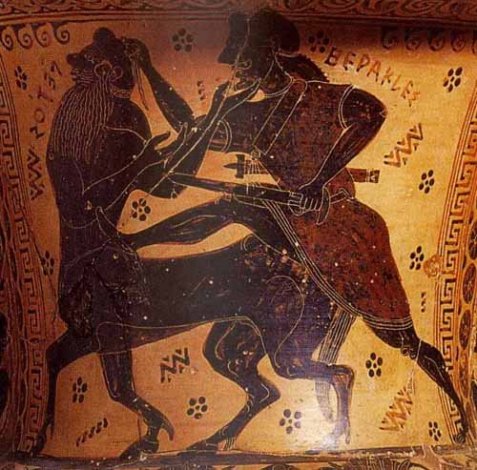HERACLES decided to attack Sparta and punish the sons of Hippocoön. They had not only refused to purify him after the death of Iphitus, and fought against him under Neleus’s command, but also murdered his friend, Oeonus. It happened that Oeonus son of Licymnius, who had accompanied Heracles to Sparta, was strolling about the city when, just outside Hippocoön’s palace, a huge Molossian hound ran at him; in self-defence, he threw a stone which struck it on the muzzle. Out darted the sons of Hippocoön and beat him with cudgels. Heracles ran to Oeonus’s rescue from the other end of the street, but arrived too late. Oeonus was cudgelled to death, and Heracles, wounded in the hollow of his hand and in the thigh, fled to the shrine of Eleusinian Demeter, near Mount Taygetus; where Asclepius hid him and healed his wounds.
b. Having mustered a small army, Heracles now marched to Tegea in Arcadia and there begged Cepheus the son of Aleus to join him with his twenty sons. At first, Cepheus refused, fearing for the safety of Tegea if he left home. But Heracles, whom Athene had given a lock of the Gorgon’s hair in a brazen jar, presented it to Cepheus’s daughter Aerope: should the city be attacked, he said, she was to display the lock thrice from its walls, turning her back to the enemy, who would immediately flee. As events proved, however, Aerope had no need of charm.
c. Thus Cepheus joined the expedition against Sparta, in which, by ill forttree, he and seventeen of his sons fell. Some say that Iphicles was also killed, but this is likely to have been the Aetolian Argonaut of that name, not Amphitryon’s son. Heracles’s army suffered few other casualties, whereas the Spartans lost Hippocoön and all his twelve sons, with numerous other men of high rank; and their city was taken by storm. Heracles then restored Tyndareus, leaving him the kingdom in trust for his own descendants.
d. Since Hera, inexplicably, had not thwarted him in this campaign, Heracles built her a shrine at Sparta, and sacrificed goats, having no other victims at his disposal. The Spartans are thus the only Greeks who surname Hera ‘Goat-eating’, and offer goats to her. Heracles also raised a temple to Athene of the Just Deserts; and, on the road to Therapne, a shrine to Cotylaean Asclepius which commemorates the wound in the hollow of his hand. A shrine at Tegea, called ‘The Common Hearth of the Arcadians’, is remarkable for its statue of Heracles with the wound in his thigh.
2. Whenever Heracles leaves an Achaean, Aerolian, Sicilian, or Pelasgian city in trust for his descendants, this is an attempted justification of its later seizure by the Dorians.
b. Having mustered a small army, Heracles now marched to Tegea in Arcadia and there begged Cepheus the son of Aleus to join him with his twenty sons. At first, Cepheus refused, fearing for the safety of Tegea if he left home. But Heracles, whom Athene had given a lock of the Gorgon’s hair in a brazen jar, presented it to Cepheus’s daughter Aerope: should the city be attacked, he said, she was to display the lock thrice from its walls, turning her back to the enemy, who would immediately flee. As events proved, however, Aerope had no need of charm.
c. Thus Cepheus joined the expedition against Sparta, in which, by ill forttree, he and seventeen of his sons fell. Some say that Iphicles was also killed, but this is likely to have been the Aetolian Argonaut of that name, not Amphitryon’s son. Heracles’s army suffered few other casualties, whereas the Spartans lost Hippocoön and all his twelve sons, with numerous other men of high rank; and their city was taken by storm. Heracles then restored Tyndareus, leaving him the kingdom in trust for his own descendants.
d. Since Hera, inexplicably, had not thwarted him in this campaign, Heracles built her a shrine at Sparta, and sacrificed goats, having no other victims at his disposal. The Spartans are thus the only Greeks who surname Hera ‘Goat-eating’, and offer goats to her. Heracles also raised a temple to Athene of the Just Deserts; and, on the road to Therapne, a shrine to Cotylaean Asclepius which commemorates the wound in the hollow of his hand. A shrine at Tegea, called ‘The Common Hearth of the Arcadians’, is remarkable for its statue of Heracles with the wound in his thigh.
***
1. Here the Heracles myth is lost in saga; and pseudo-myth is introduced to explain such anomalies as Goat-eating Hera, Hollow-of-the-Hand Asclepius, Heracles of the Wounded Thigh, and Tegea’s long immunity from capture. But Hera’s wild women had once eaten Zagreus, Zeus, and Dionysus in wild-goat form; Asclepius’s statue probably held medicines in the hollow of the hand; the wound in Heracles’s thigh will have been made by a boar; and the Tegeans may have displayed a Gorgon’s head on their gates as a prophylactic charm. To assault a city thus protected was, as it were, to violate the maiden-goddess Athene: a superstition also fostered by the Athenians.2. Whenever Heracles leaves an Achaean, Aerolian, Sicilian, or Pelasgian city in trust for his descendants, this is an attempted justification of its later seizure by the Dorians.

Comments
Post a Comment